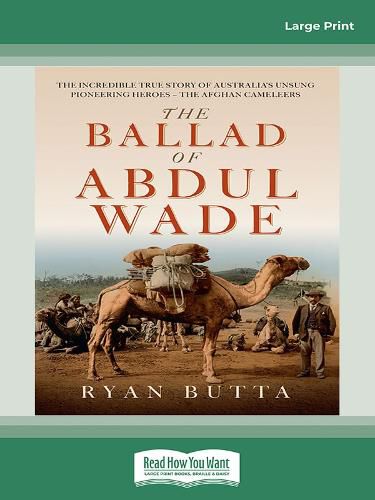Readings Newsletter
Become a Readings Member to make your shopping experience even easier.
Sign in or sign up for free!
You’re not far away from qualifying for FREE standard shipping within Australia
You’ve qualified for FREE standard shipping within Australia
The cart is loading…






When Afghan entrepreneur Abdul Wade first brought his camel trains to the outback, he was hailed as a hero. Horses couldn’t access many remote settlements, especially those stricken by flood or drought, and camel trains rode to the rescue time and time again. But with success came fierce opposition fuelled by prejudice. The camel was not even classed as an animal under Australian law, and, in a climate of colonial misinformation, hyperbole and fear, camel drivers like Wade were shown almost as little respect. Yet all the while, for those in need, the ships of the desert continued to appear on the outback horizon. After his interest was piqued by a nineteenth-century photo of a camel train in a country town, Ryan Butta found himself on the trail of Australia’s earliest Afghan camel drivers. Separating the bulldust from the bush poetry, he reveals the breadth and depth of white Australian protectionism and prejudice. Told with flair and authority, this gritty alternative history defies the standard horse-powered folklore to reveal the untold debt this country owes to the humble dromedary, its drivers and those who brought them here.
$9.00 standard shipping within Australia
FREE standard shipping within Australia for orders over $100.00
Express & International shipping calculated at checkout
When Afghan entrepreneur Abdul Wade first brought his camel trains to the outback, he was hailed as a hero. Horses couldn’t access many remote settlements, especially those stricken by flood or drought, and camel trains rode to the rescue time and time again. But with success came fierce opposition fuelled by prejudice. The camel was not even classed as an animal under Australian law, and, in a climate of colonial misinformation, hyperbole and fear, camel drivers like Wade were shown almost as little respect. Yet all the while, for those in need, the ships of the desert continued to appear on the outback horizon. After his interest was piqued by a nineteenth-century photo of a camel train in a country town, Ryan Butta found himself on the trail of Australia’s earliest Afghan camel drivers. Separating the bulldust from the bush poetry, he reveals the breadth and depth of white Australian protectionism and prejudice. Told with flair and authority, this gritty alternative history defies the standard horse-powered folklore to reveal the untold debt this country owes to the humble dromedary, its drivers and those who brought them here.